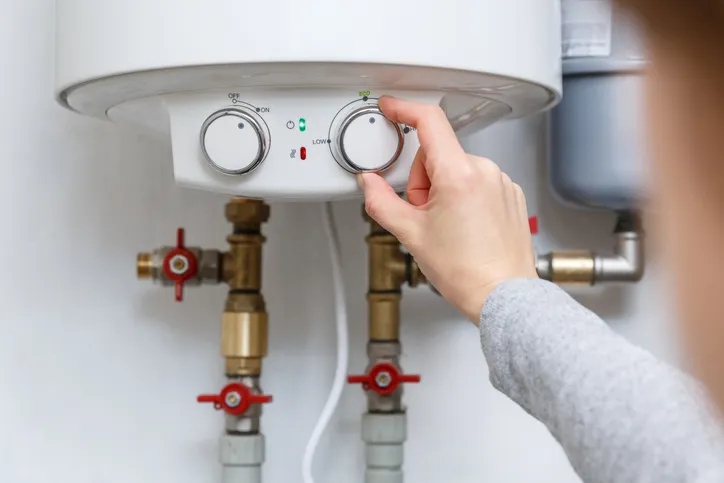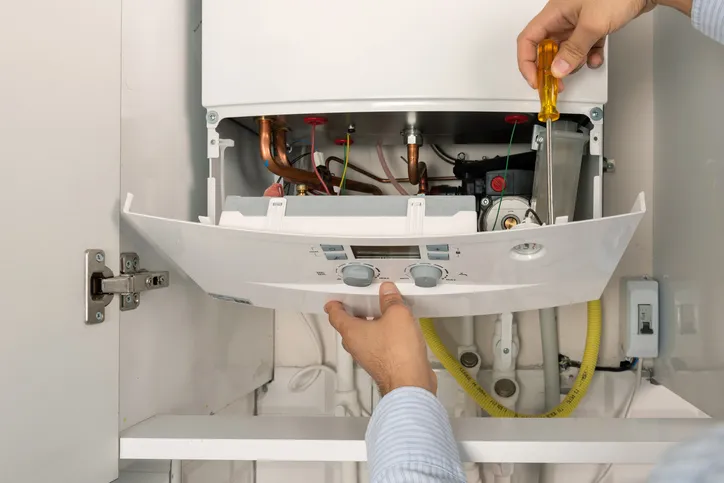Water Heater Repair in Agoura Hills, CA
Serving Ventura & Sacramento Counties

A broken water heater disrupts daily life fast. In Agoura Hills, CA, where cool coastal evenings and variable winter mornings make reliable hot water essential, prompt, professional water heater repair keeps your household running and protects your home from costly water damage. This page explains common failures, how technicians diagnose problems, typical repairs and parts replacement, and when replacement is the smarter, more cost-effective choice.
Why timely water heater repair matters in Agoura Hills
- Protects your home from water damage. A hidden leak can ruin floors, cabinets, and framing in hilltop and canyon homes common to the area.
- Maintains safety. Faulty gas controls or poor venting on gas heaters increase carbon monoxide and combustion risk. Electrical failures can create fire hazards.
- Saves energy and money. Sediment buildup and failing elements make heaters work harder, increasing bills—important in a region focused on energy efficiency.
- Preserves comfort. Reliable hot water for showers, laundry, and dishes is critical during cooler months and busy mornings.

Common water heater issues in Agoura Hills, CA
- No hot water or inconsistent heating. Often caused by failed heating elements (electric), bad thermostats, or inadequate gas supply/ignition (gas units).
- Pilot light wont stay lit / ignition problems. Thermocouple failure, clogged pilot orifice, or a faulty gas control valve are typical causes.
- Water leaks from tank or fittings. Leaks at plumbing connections, valves, or tank corrosion. A leaking tank usually signals end of life.
- Rusty or discolored water. Corroded anode rod or internal rust—can also cause metallic taste and accelerate tank failure.
- Strange noises (popping, rumbling). Sediment accumulation causes localized overheating and popping sounds.
- Low hot water capacity. Sediment, failing dip tube, or aging unit losing efficiency. For tankless systems, scale buildup or failed heat exchanger/flow sensors reduce output.
- Pressure relief valve discharge. Overpressure or a failing T&P valve that needs replacement or system adjustment.
Diagnostic process: what to expect
A trained technician follows a systematic approach to find the root cause:
- Visual inspection. Check for leaks, corrosion, proper seismic strapping, venting condition, and visible wiring or gas lines.
- Operational checks. For gas units: verify pilot/ignition, gas pressure, and vent draft. For electric units: test heating elements and thermostats. For tankless: read error codes, check flow sensor and gas combustion (if gas-fired).
- Pressure and temperature checks. Confirm thermostat settings, measure outlet temperature, and test T&P valve operation.
- Electrical and gas testing. Multimeter tests on elements and controls; check for proper voltages and safe wiring. Gas appliances receive combustion analysis when needed.
- Internal inspection. If safe and necessary, inspect anode rod, dip tube, and sediment level—common culprits in Agoura Hills homes with moderately hard water.
Typical repairs and parts replacement
- Heating element replacement (electric). Quick swap of one or both elements restores heat when element failure is isolated.
- Thermostat replacement. Restores temperature control and prevents overheating or cold water issues.
- Thermocouple or gas control valve replacement (gas units). Fixes pilot/ignition problems; gas control valves are common wear items.
- T&P (temperature and pressure) valve replacement. Essential safety repair whenever the valve leaks or fails a test.
- Anode rod replacement and tank flushing. Removes corrosive elements and sediment to extend tank life and efficiency—particularly effective in hard-water areas.
- Dip tube replacement. Restores hot-water delivery when cold water mixes into the hot output.
- Piping and fitting repairs. Replace corroded or leaking supply/return lines, shutoff valves, or relief valve piping.
- Control board, flow sensor, or heat exchanger repair (tankless). Tankless systems need electronic components and descaling to maintain performance; some heat exchanger failures may require replacement.
- Venting and combustion repairs. Fix blocked or damaged venting on gas units to ensure safe operation.
When a tank shows localized rust, multiple corroded fittings, or a large leak, repairs are often temporary. Tank patching is a short-term measure and not recommended for long-term reliability.
When repair is more cost-effective — and when to replace
Repair is generally the right call when:
- The unit is under 6 to 8 years old and a single, clearly identified component has failed.
- A repair will restore full function and efficiency without recurring problems.
- The issue is limited (heating element, thermostat, T&P valve, dip tube, anode rod).
Replacement is often wiser when:
- The tank is older than 10 to 12 years and showing corrosion, recurring leaks, or multiple failing components.
- Repair costs approach or exceed 50% of a reasonable replacement cost.
- There is extensive rust inside the tank, significant sediment damage, or repeated service visits for different failures.
- You want improved energy efficiency, a switch from tank to tankless, or increased hot water capacity for household changes.
- Tankless units with major heat exchanger failures or repeatedly failing electronics may also be candidates for replacement.
Consider local factors: replacing an inefficient tank with a modern high-efficiency or tankless model can reduce energy bills in Southern California’s climate and may provide space savings in smaller Agoura Hills homes. Also confirm seismic strapping and local code compliance at installation.
Preventive maintenance and simple homeowner checks
Annual maintenance reduces emergency repairs and extends service life:
- Flush the tank once a year to remove sediment (more often with hard water).
- Inspect the anode rod every 2–3 years and replace if heavily corroded.
- Test the T&P valve by lifting the lever briefly (careful—hot water will discharge).
- Check for leaks and corrosion around fittings and the tank base.
- For tankless systems, have the unit descaled and filters cleaned annually if you have hard water.
- Keep temperature at 120°F to balance comfort, energy use, and scald risk.
- Confirm seismic straps and proper venting to meet California safety standards.
Long-term benefits of prompt repair and proper maintenance
Addressing water heater problems quickly preserves safety, prevents destructive leaks, maintains energy efficiency, and extends the working life of your system. In Agoura Hills, where homes can be older and water quality can accelerate wear, routine inspections and early repairs deliver the best value and the most reliable hot water year-round.
For any water heater issue—pilot light or ignition trouble, leaks, heating element failure, or tankless performance problems—understanding the diagnosis, likely repairs, and replacement considerations helps you make the most cost-effective, safe decision for your home in Agoura Hills, CA.
Schedule Your Water Heater Repair Today
Don’t let water heater problems disrupt your daily routine or put your home at risk. From leaks and ignition failures to sediment buildup and scale-related issues, timely repair restores reliable hot water while preventing costly damage. In Agoura Hills, where seismic safety, hard water, and energy efficiency are key concerns, professional water heater repair ensures your system runs safely, efficiently, and in compliance with California codes.
Restore comfort and protect your home—schedule your water heater repair with AirWorks Heating Air Plumbing today and keep hot water flowing reliably year-round.


